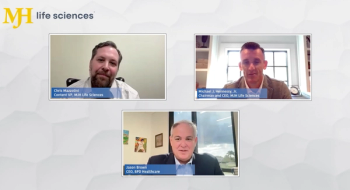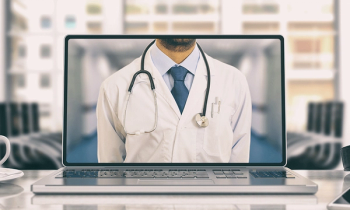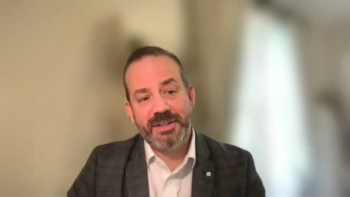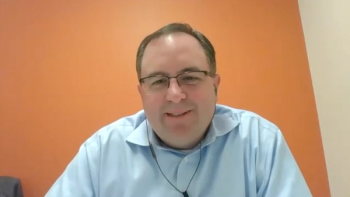
PX: What Does Digital Health Mean to You?
What is digital health to you? A social science? Patient-centric? Our 4 KOL's have some differing views.
What exactly is digital health? How can big data, artificial intelligence (AI) and digital health improve healthcare? Our expert panel gives their final thoughts on the empowerment of these technologies in the health sector:
Leveraging Big Data and AI in the Hospital of Tomorrow
A Healthcare Analytics News™ Peer Exchange®
Segment 11/11
Kevin R. Campbell, M.D.: (David and I) both trained at Duke University and there's a very famous professor there who used to say, “What this patient needs is a doctor, and he needs him right now.”
John Nosta, B.A.: Well, of course, that was the doctor saying that.
David E. Albert, M.D.: It was a doctor saying that to the junior doctor.
John Nosta, B.A.: It’s a self-fulfilling prophecy.
Kevin R. Campbell, M.D.: That was a doctor teaching.
>>
David E. Albert, M.D.: Because it was basically a doctor insulting junior doctors that this patient, who you just presented to me, needs a real doctor.
Kevin R. Campbell, M.D.: We need to get better, we need to improve.
David E. Albert, M.D.: It was Dr. Eugene A. Stead, a very famous chairman of medicine at Duke University. I think we all know that we need more innovation — this area of digital health. I’ve been asked many times: what is digital health to you? Digital health is nothing more than focusing on the patient, whether it’s patient-sourced data or patient in the home, it is focusing on the patient. Pharmaceutical companies now market to patients, but they’ve traditionally marketed to doctors. Medical device companies still market exclusively to doctors, to hospitals, and the patient, unfortunately, should be the center of those activities. To me, the essence of digital health is that we’re finally bringing the patient into that circle of the stakeholders and putting them in the middle of it, which is where they should be.
Geeta Nayyar, M.D., MBA: The biggest problem to that concept — so I think we are all completely aligned that the patient needs to be at the center —
John Nosta, B.A.: I’m not aligned with that even remotely.
Geeta Nayyar, M.D., MBA: Transparency, right? Number one, it’s very hard to be a consumer in medicine; you don’t know what you’re buying half the time.
John Nosta, B.A.: Sure, exactly.
Geeta Nayyar, M.D., MBA: Two, you don’t know how much it costs.
David E. Albert, M.D.: That’s correct.
Geeta Nayyar, M.D., MBA: And then you don’t know how to interpret it. Even if you have all your data, lab work and x-rays, you have no clue what you’re looking at. That’s one of the challenges for the consumer in today’s model: the idea that there needs to be interpretation and transparency.
Kevin R. Campbell, M.D.: But I also think, and John might agree with me on this, that we have ways to get that data interpreted through reliable searches, websites and other reliable sources, so that I can understand. I can’t tell you how many of my friends say, “Hey, my doctor just did this lab work. I have no idea what it means,” and they’ll text me their lab work and I interpret it for them. But we could find another way to do that, potentially.
John Nosta, B.A.: I don’t think that digital health is a social science. I think that digital health is the empowerment of technology, whether it be nanoparticles, CRISPR [clustered regularly interspaced short palindromic repeats], or immuno-oncology. That’s the magical convergence of science and technology, which will ultimately serve patients. But if you ladder the endeavor up to the ethereal feature, benefit, value — everything becomes consumer-centric — cars, restaurants. And it just becomes laddered up into an undifferentiated pablum of: “I’ve got my life back; whether it’s an arthritis advertisement, I’ve got my life back; CHF [congestive heart failure], I’ve got my life back; schizophrenia, I’ve got my life back.” All of them say the same thing. And the pharmaceutical companies all have the tagline: “Innovate for life.” It’s nonsense. I think we should return to the roots of science and the wonder of discovery and recognize that we are here to serve the patient, but we don’t have to ascend to this notion of patient-centricity. I think it’s a big, big mistake. And, finally, for anyone who’s climbed that ladder —
David E. Albert, M.D.: A big mistake?
Kevin R. Campbell, M.D.: Why are we doctors? We’re doctors to serve patients. They are at the center of the doctor universe. Why the heck do we even have medicine if all we want to do is play with toys?
>>
John Nosta, B.A.: The practice of medicine may be a little bit closer to that construct, but I believe the initial premise was digital health, and I expanded that into pharmaceutical.
Kevin R. Campbell, M.D.: You just said that digital health has nothing to do with the patient.
John Nosta, B.A.: Correct, it is not a social science.
Kevin R. Campbell, M.D.: And you just said that the patient is not at the center. Nothing in medicine, whether it’s digital, whether it’s a stethoscope, whether it’s my hands, my breath, and my voice, is not patient-centric.
John Nosta, B.A.: The hotel business is the same way; it all matters about the customer. The restaurant business is the same thing. It’s undifferentiated and it becomes laddered up to this top step. If you’ve ever climbed a ladder, it says something up here; it says, “danger,” “warning, do not step here,” and I think that’s where we’re moving into this undifferentiated patient-centricity. The magic of digital health, I believe, lives in the application of technology to patients.
David E. Albert, M.D.: Undifferentiated from what? Digital health is a phrase that’s used for a lot of things. Principally, it’s focused in today’s world on things related to that powerful smartphone in your pocket.
John Nosta, B.A.: That’s fair.
David E. Albert, M.D.: Whether it’s using Zocdoc to schedule an appointment, interfacing MyChart into the Epic of your healthcare provider, or using AliveCor’s ECG [electrocardiogram] device — it is around the ability to acquire, analyze and communicate information about you that hopefully will improve your health or the treatment of your disease. To me, again, I come back that that wasn’t medicine. Medicine was focused — when I trained a long time ago — medicine was focused on the hospital, first of all, and it was focused on treating diseases. And our thought about the patient was the patient is an example of a disease. And, oh, by the way, when the nurse wheeled that patient out the door, it was over.
Only when the government said, “If that patient comes back within 30 days, it’s your nickel now,” did they become concerned about what happened when that door closed on that car. And, by the way, that’s sad that that was it, but that was true. I think the smartphone is empowering people; it puts Dr. Google in their pocket anywhere, anytime.
I am wholeheartedly for it, even though sometimes Dr. Google is totally wrong. But we’re going to make mistakes, we’re going to stumble, but I think our trajectory is correct. I still see the notion that the patient is the critical factor and that we lift the veil off the cost conundrum, the master price list, and all these things that we do to hide that 19 percent of GDP [gross domestic product] that we’re spending. We want to hide it; it’s not over here, it’s over there, it’s third party. Any other business where you ever heard the term reimbursement? There is no other business where the term is reimbursement. It’s usually price, cost, pay, bill.
Kevin R. Campbell, M.D.: Why does a hip replacement cost 10 times in New York what it costs in Oklahoma City? Why? Same procedure, same tools.
David E. Albert, M.D.: I will hope that AI and big data — predictive analytics — will in some measure allow us to address those real issues, which come down to money.
Kevin R. Campbell, M.D.: This is what I’d love to do. We’re running short on time here. I would love to give every panelist one minute for final thoughts on AI, big data and medicine. John, let’s start with you.
John Nosta, B.A.: Let’s keep it short and sweet: we have to ask ourselves: “Is AI man’s last great invention?” We are going to shift creativity from humanity to a thinking machine. Now, I’m not saying it’s going to happen, and I know you’re going to recoil when you hear that, but I think that is an emerging reality that has to be put in some kind of human context.
Geeta Nayyar, M.D., MBA: I disagree. I think AI is a tool like any other tool, any number of tools that have come and gone in medicine, whether we talk about the da Vinci robot or invasive procedures that have now become noninvasive. I think AI is an extraordinary tool. It will be a powerful tool in medicine. It will be one of the many tools we use as doctors and continue to use in our practice to make things evolve and that much better for the patient.
Kevin R. Campbell, M.D.: Dr. Albert?
David E. Albert, M.D.: I echo what Geeta says. I consider [that] AI, at least today and the promise of the future, will enable us to improve healthcare, access, lower costs and prevent disease. But it’s not going to happen tomorrow: this is a process like driverless cars that will take probably decades, but I’m very optimistic that when my children are my age, that they will have AI-enabled healthcare.
Kevin R. Campbell, M.D.: Well, I can’t thank you guys enough for being here today. This has been a fantastic discussion. John, Geeta, David, it’s just been great to have you on the panel. I love the fact that we’ve been able to discuss some really difficult issues and we’re actually trying to be fortune tellers. We’re trying to predict the future. So, on behalf of our panel, we thank all of you for joining us today. We hope you found this Healthcare Analytics News™ Peer Exchange® to be helpful, useful and informative. We look forward to seeing you again next time.
Get the best executive insights directly to your inbox. Sign up for our
Related






























